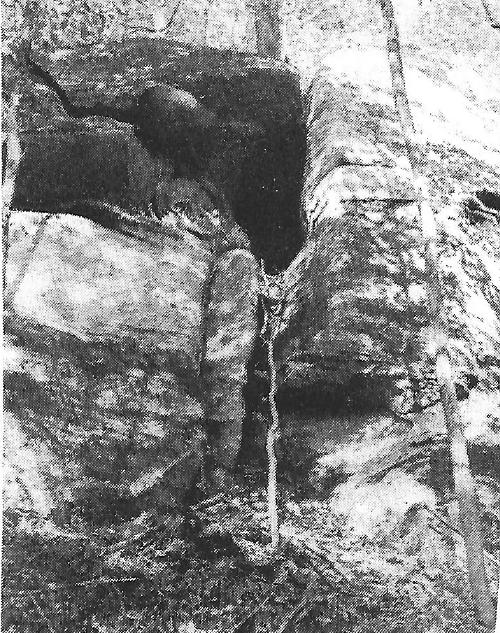HUR HERALD'S TALES OF BEAR FORK - Myths Of Hidden Treasure, A Ghostly Tale Of Searching

Alleged cave "Noise Hollow" that was once
believed to be a secret Bear Fork treasure
By Bob Weaver 2022
There are at least two myths of hidden treasure in the Bear Fork Wilderness, depending on which version one heard. One was related to hidden treasure during the Civil War and the other, the hiding of $2,000 in silver.
Dozens of families homesteaded in the wilderness "rent free" during the 1800s and early 1900s, some staying for three generations.
Nearly all heard the treasure tales and many of them searched the woods for the loot, including earlycomer Sam Lawson.
Lawson, in his old age, wrote in 1934:
"I remember well when the war broke out in 1861. It seemed to be the ambition of everyone to kill and destroy. My first recollection of the war was a gang of soldiers burning our house to the ground."
"While the house was burning they went into the field and shot my stepfather through the head. After the two dastardly deeds were done, they calmly rode away with the horse my stepfather had been using while plowing."
"We always thought the reason we were treated so cruelly was because I had two outlaw uncles who helped to rob a rich Dutchman over in Gilmer County. His name was Michael Gerwig. My uncles stole money from him, burying it near our house on the edge of Gilmer County."
"So far as I know, that money has not been found yet. Both these uncles were killed later while serving in the Confederate Army, but we were innocent relations and suffered much for their crime."
A fanciful tale was written in the 1980s about a more current search in an article which we obtained a partial clip, the author unknown.
Arriving at the cave:
"Up on the rock face we made it, with nervous laughter, agreeing we could be at the site of the treasure. We walked slowly to the rock wall. We found three poles that might have been used by a treasure hunter from generations ago. Anxious faces held a tremor of fear."
"We clung to the pole, hand over hand, our arms scrapped by protruding rocks...Nearly reaching the top, a strong wind swept through...I clung tighter to the pole, mustering my strength to reach the opening. Then a sound began to permeate the surroundings and I could no longer hear my friends below, only mournful sounds which cut through my spine."
"As I peered into the cave opening, I thought I could see a small wisp of dirt rising from the cave floor...driven by desperation into the cave by a force greater than I had even known, my friends and the outside disappeared from view."
"The cave was much smaller than I anticipated. The ceiling had a web formation, unlike any I had ever seen...more like a rich, lacy cocoon, shaped like an arrow, pointing to the floor of the cave. I called for my companions and received no answer, no sound to be heard. I was totally alone."
The story turns toward a desperate experience inside the cave, where the powdery dirt begins to move under the searcher's feet.
"My heart began to pound as a sweat began to break over my body as I couched at the end of the cave, an animal fled passed me to leave the darkness. I looked further into the recesses and saw a set of peering eyes. A tremor shook my body as I went toward the entrance, looking for my friends whose help I needed to exit the cave."
"I knew I must exit the cave on my own if I was to leave the hollow alive... I was filled with fear the likes of which I have never known...As I looked below, the pole miraculously appeared, leaving scrapings of flesh on the descent as if the devil was after me."
The writer then says he fell into a state of unconsciousness, running from the cave, never to return.
Gilmer County historian recalled others who took up the search, including Johnnie Cottrell (born 1835) who made the search with Jim Carpenter and Okey Rogers. recalling a rising fountain of water, high winds and strange voices.
Noah Cottrell (born 1800) recalled a Beech tree on Hoophole Hollow with a hand carved into it pointing in the alleged direction of the treasure. Noah spoke of his father John who told stories of "Noise Hollow," hearing sounds that set his hair on end.
He also said that he believed his uncle Minter Kyer had found the treasure, walking around with unexplained wealth.
Charlie Riffle, longtime Bear Fork resident, said he was in the cave and only found an old rotted satchel, and that a landslide had cut off access.
In more modern times, historian Ron Miller and friends went in search of the treasure, entering the cave about twenty feet up a hillside. He recalled such an effort forty years earlier.
So the mystery of Bear Fork treasure remains elusive in the 21st Century.
- Another special tribute is given to the late Ron Miller of Gilmer County, whose life-long efforts have led to the preservation of Bear Fork's wilderness history, in dozens of articles "Tales of Bear Fork" are recorded by the Hur Herald. - Bob Weaver